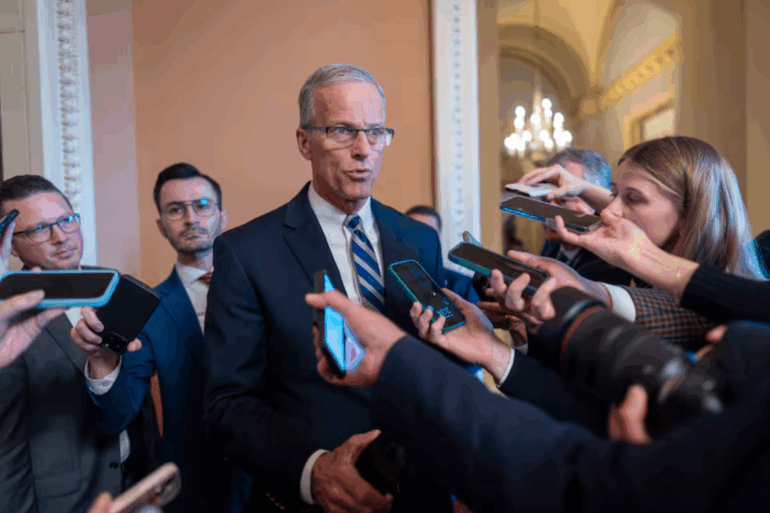The longest government shutdown in modern U.S. history entered its 38th day on Friday, with no end in sight. Republican leaders swiftly rejected a Democratic proposal to reopen the government while extending Affordable Care Act (ACA) subsidies for one year. As unpaid federal workers, delayed food aid, and canceled flights pile up pressure on both parties, lawmakers remain locked in a bitter standoff over health care policy.
GOP Predicts Prolonged Pain Past Thanksgiving
Rep. Tim Burchett (R-Tenn.) warned that the shutdown will likely extend beyond Thanksgiving. In an interview on “The Hill on NewsNation,” Burchett said the impasse would continue until a few Democrats break ranks and agree to negotiate health care issues after reopening the government.
“I think it’s going to go on after Thanksgiving,” Burchett told anchor Black Burman. He accused Democrats of being influenced by health insurance companies that profit from Obamacare. “It’s not about taking care of people. It’s about power. It’s about control. It’s arrogance,” he added, comparing the situation to Democrats chasing a $5 bill on a fishing line.
Burchett praised Republicans for passing a “clean” continuing resolution to fund the government temporarily without policy add-ons. He echoed President Trump’s suggestion to reopen the government first and then discuss expanding expiring health care subsidies.
Democrats’ Offer Falls Flat
Earlier Friday, Senate Democratic Leader Chuck Schumer (D-N.Y.) proposed a deal on the Senate floor: a short-term funding stopgap, a three-bill “minibus” for bipartisan priorities like food aid and veterans’ programs, and a one-year extension of ACA tax credits. Schumer also suggested simultaneous votes and a bipartisan committee to address GOP demands for ACA changes.
“All Republicans have to do is say yes,” Schumer urged.
The offer was a scaled-back version of Democrats’ earlier push for permanent subsidy extensions and reversing Medicaid cuts. It came after bipartisan talks collapsed Thursday, following a Democratic caucus meeting where members sought stronger concessions.
Republicans dismissed it immediately. Senate Majority Leader John Thune (R-S.D.) called it a “nonstarter,” insisting health care negotiations can only happen after the government reopens. “A one-year extension along the lines of what they’re suggesting … it just doesn’t even get close,” Thune said. He noted the proposal lacked protections for the Hyde Amendment, which prohibits federal funds for abortions.
Sen. Lindsey Graham (R-S.C.) labeled the deal “terrible,” highlighting a 1,000 percent stock price increase for the five largest health care companies since 2010. “The program is broken, and I’m not going to keep giving hundreds of billions of dollars to insurance companies,” Graham said, arguing the subsidies fuel inflation.
House Republicans echoed the criticism. Rep. August Pfluger (R-Texas), chair of the Republican Study Committee, deemed it a nonstarter, while the conservative House Freedom Caucus called it “absurd.”
Growing Impacts and Political Pressures
The shutdown’s effects are worsening. Airlines have cut over 1,000 flights due to TSA staffing shortages, millions face delays in food assistance, and federal employees remain without pay. Emergency food distributions, like one in Philadelphia on Friday, underscore the human toll.
Despite the urgency, Senate Republicans met Friday without a breakthrough. “We’re back to square one,” said Sen. John Kennedy (R-La.). Thune kept the Senate in session over the weekend, pleading with Democrats to “end these weeks of misery.”
Democrats drew encouragement from recent election wins, which President Trump admitted hurt Republicans. Progressives, including Sen. Bernie Sanders (I-Vt.), insist on firm commitments for subsidy extensions rather than just a promised vote. House Speaker Mike Johnson (R-La.) refused to make guarantees: “I’m not promising anybody anything.”
A top Democratic aide described Schumer’s offer as an “acceptable off-ramp” that fulfills promises to constituents, with most House Democrats supporting it.
Moderate Efforts and Potential Paths Forward
Behind the scenes, a group of moderate Democrats, led by Sen. Jeanne Shaheen (D-N.H.), continues negotiating with Republicans. Their emerging plan includes the minibus bills, extended funding until December or January, and a commitment to vote on ACA subsidies by year’s end—without guaranteeing passage.
Republicans need just five Democratic votes to reopen the government. The moderate group has 10 to 12 senators involved. “We’re working on it,” Shaheen said after a Friday meeting, noting GOP rejection of Schumer’s proposal forced a new approach.
Thune is considering a similar bipartisan package to replace a House-passed bill Democrats have rejected 14 times, which would fund the government only until November 21. President Trump urged Republicans to end the shutdown and even scrap the Senate filibuster for quicker action, but GOP leaders rejected that idea.
Democrats face a tough choice: prolong the shutdown for stronger health care gains or reopen the government and trust future negotiations. Most indicate they will hold firm. “You have the gavel, you have the majority, you have to bring people together,” said Sen. Ben Ray Luján (D-N.M.).
As the holiday season approaches, the shutdown tests both parties’ resolve. With subsidies expiring in January and no deal in sight, the political gridlock shows few signs of breaking.
